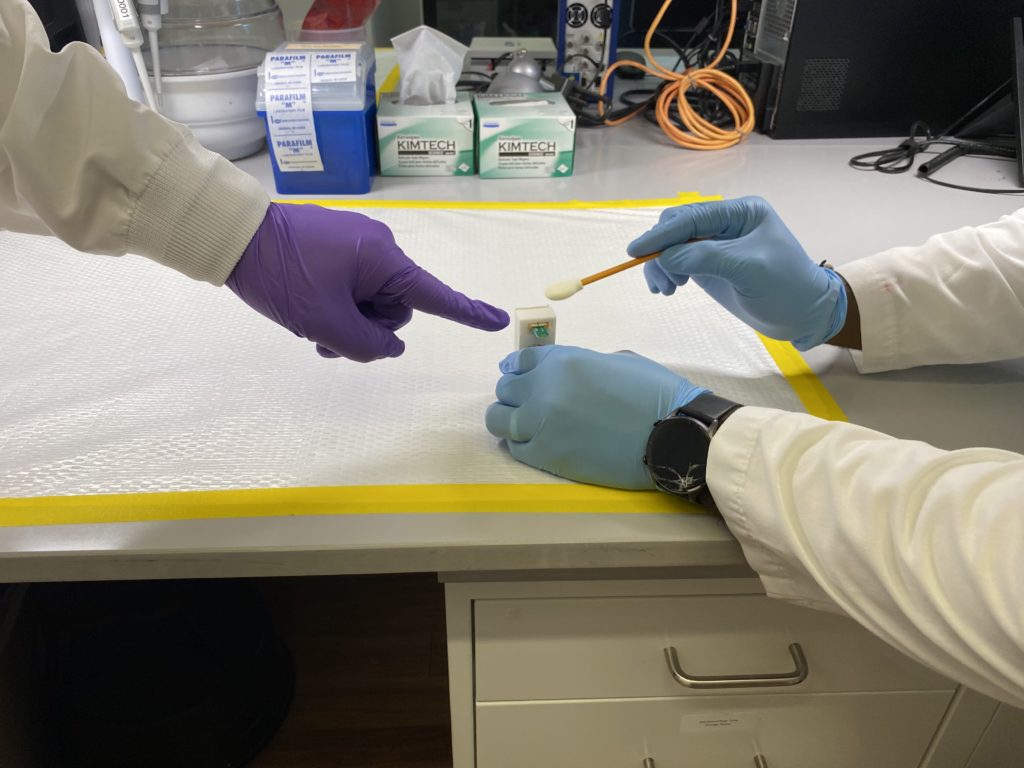Much like a breathalyzer with alcohol, the recently developed CannibiSenS can determine how much THC, the active ingredient in marijuana, is in a consumer’s body.
The CannibiSenS, a device that measures THC levels through a saliva test, was developed earlier this year by a group of researchers at UTD, including biomedical engineering Ph.D. student Nathan Kodjo Mintah Churcher, research assistant Vikram Narayanan Dhamu and bioengineering professor Shalini Prasad. The device can measure THC levels, differentiate THC and CBD with up to 94% accuracy and can help cannabinoid consumers manage their intake. Though designed for medical purposes, the ability to detect THC levels may lead to advancements in research and pose new questions for law enforcement surrounding cannabis use.

Associate professor Francesca Filbey, who studies how cannabis affects the brain and behavior, said that the CannibiSenS can objectively measure levels of cannabinoids like THC in a person’s system. Like with alcohol, different people metabolize cannabis at different levels — so different people might have very different responses to five milligrams of THC. According to Filby, legislation surrounding cannabis makes it difficult to study from a scientific point of view and is one of the least understood substances. Since our knowledge on cannabinoids is still lacking compared to alcohol, there is not necessarily a known level where a test can tell if someone’s behavior is impaired.
“I think it’s important to study cannabis because we are seeing a change, or shift, not just in policy but also in people’s perceptions of what cannabis is and whether it’s harmful or not,” Filbey said. “And I think a lot of those beliefs are not driven by scientific knowledge.”
Currently, the distribution and possession of cannabis is illegal in Texas, excluding medical products that contain low amounts of THC — 0.3% and 0.5% — and the current method for determining someone’s level of cannabis intake takes far longer than the CannibiSenS. UTD chief of police Brent Tourangeau said that an officer needs probable cause — including reckless driving, strong odors or abnormal conversations — in order to get a search warrant to then perform a blood test. These are not always accurate indicators, as the source of an odor can be difficult to pinpoint in some locations like dorms or apartments. Tourangeau said he can see the CannibiSenS being used as a tool to give an indication of probable cause, although there may be too many questions to make it completely accurate.
“How long does it take to get into the blood, at what concentration levels and is the level in your blood a good indicator of how the marijuana is affecting your brain?” Tourangeau said.
When designing the CannibiSenS, the research team considered many different methods including a blood or urine sample, but ultimately decided a saliva sample was the most feasible and noninvasive option for roadside testing. According to Churcher, THC can interfere with your reaction time, perception and hand-eye coordination. Cannabis is classified by the government as a Schedule 1 drug, meaning it has a high potential for abuse, though spreading legalization in America has resulted in many states setting legal limits.
“So even though the overarching goal is for law enforcement to be able to use this for on-site testing, it also provides the opportunity for people to measure and have a feel of where their levels are before they make the decision to go on the road or not,” Churcher said.
According to Prasad, it is important to accurately distinguish between CBD and THC, as THC inebriates a user while CBD does not; this was a key goal for the development of the CannibiSenS, as a false positive would have negative legal consequences. When asked about the CannibiSenS’s legal impact, the lack of an established inebriation limit prevents its use now, but further research into cannabis could change this.
“We expect looking at the way marijuana has become legalized across the United States, that it would be [legal] at some point of time in the near future,” Prasad said. “So, at that point you would definitely need to have technology that can help exactly, like how we have today with an alcohol test.”
Prasad said the Texas Department of Public Safety has shown interest in the outcome of the CannibiSenS. However, because of Texas laws surrounding cannabis, research into law enforcement use has not gone far.
“We have not figured out how, but we’ve had a number of police departments reach out to us locally from the North Texas area community itself,” Prasad said. “Even people from Houston. Clearly there’s a need, they see the need, so the question is, how can we do this in Texas that would make this accessible as a technology.”
Leave a Reply